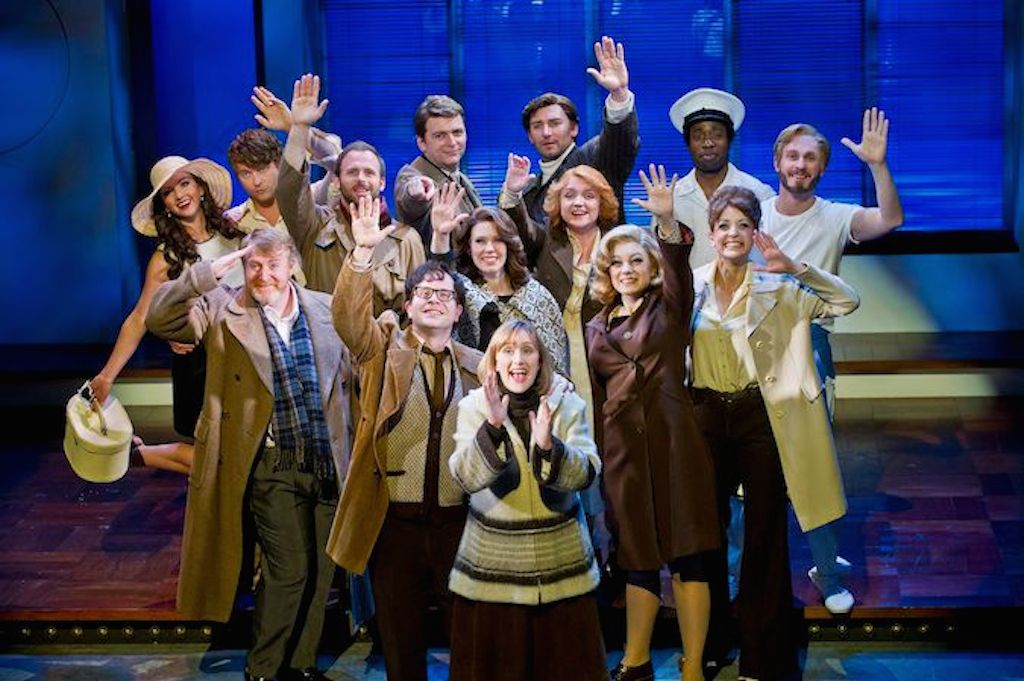This post is one in a series on friendship, explored through the lenses of Stephen Sondheim’s Merrily We Roll Along and C.S. Lewis’s The Four Loves.

In high school, I took a survey history course on the Middle East, which ran in reverse. We started at the present day, and worked our way backwards, with a sense of suspense to discover the cause of the war whose consequences we had learned in the last lecture. Merrily We Roll Along follows a similar format, spooling out its story backwards, from the last straw to the very beginning of a friendship. And the music encourages the viewer to ask:
How does it happen?
When does it disappear?
Isn’t it always clear?
How does it start to go?
How does it slip away slow
So you never even notice it’s happening?
How did you get there from here, Mr. Shepard?
There are technically two mysteries to solve: the unraveling friendship between Frank, Charlie, and Mary, three artists who stopped working together (and, ultimately, speaking to each other) and the personal decline of Frank, who goes through two wives and has stopped working on art that inspires him.
I’ve seen the show staged a couple of times without feeling like I could form much of a hypothesis on either front, and, as a result, the whole show has felt a little fatalistic. If the story is one of gradual, inexorable decline, there’s not much the viewer can learn from the story — it feels more like the kind of ruin porn that draws gawkers to Detroit.
But, in the Digital Theatre production, I got a sense of Frank and his friends’ besetting sins. Near the beginning of the show, when Frank is arguing with Gussie, his (presumably) soon to be ex-wife, he says that he only has one regret, “Saying yes, when I meant no.” That set me off on a look for what that particularly ill-advised ‘Yes’ had been, and I think I found it in “Now You Know.”
https://www.youtube.com/watch?v=UCwCBZzNAN8(Unfortunately I can’t find a performance clip for that song)
In “Now You Know” Frank’s friends are trying hard to keep him from continuing to fight his wife over the terms of their divorce. Frank’s wife wants sole custody of their son, and, if he continues to resist, she plans to reveal his infidelity with the star of his latest musical. I’ve seen productions of Merrily where Frank comes off as so self-involved as to be unsympathetic, but the Frank of this production, who keeps telling his friends, “But it’s my son!” clearly is capable of love.
The trouble is, his friends are so eager to make him happy again, they refuse to let him mourn. They ring around Frank telling him that he should go on a cruise, take some time off, and that, eventually the loss of his son and his wife won’t burden him.
An exit from one place
Is an entrance to another.
Right!
Best thing that ever could have happened! ?
It was all getting much to complicated anyhow ?
Best thing that ever could have happened!

While the other singers look forward, promising Frank new pleasures, to substitute for the old (movie deals, etc), his friend Mary tries to look back and reassure him by convincing him that the old pleasures were hollow to begin with:
All right, now you know:
Life is crummy.
Well, now you know…
It’s called flowers wilt,
It’s called apples rot,
It’s called theives get rich and saints get shot,
It’s called God don’t answer prayers a lot,
Okay, now you know.
Okay, now you know,
Now forget it.
Don’t fall apart at the seams.
It’s called letting go your illusions,
And don’t confuse them with dreams.
While she and the others sing, Frank is bent almost double by the weight of his grief and their concern. He only rises again when he joins the chorus they’ve been singing. He says “Yes” to his friends, to their promise that this loss isn’t important, and never finds a way out of that lie.
When he comes back from his trip, he doesn’t have a way to differentiate between the higher love he felt for his son and the coarser attachments offered to him by his mistress — not without repudiating the reassurance offered to him by his friends. Frank’s friends had no way to address suffering except by erasing it — either by denying the gravity of loss or by arguing there’s nothing in our world that really hard to lose.
When their friendship hits the rocks, they don’t have a way to be patient with each other’s pain, and the other two aren’t as willing as Frank to bury their hurt in order to reassure their friends that, of course, the friendship itself is all that is necessary to live happily.












